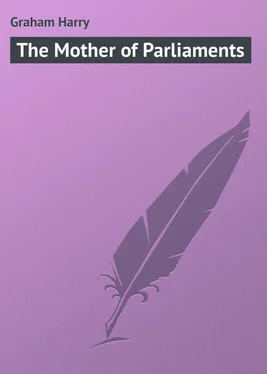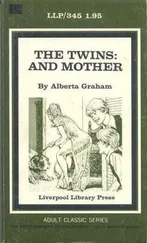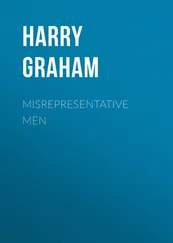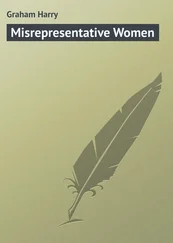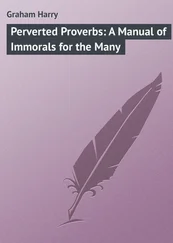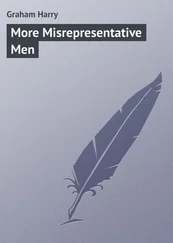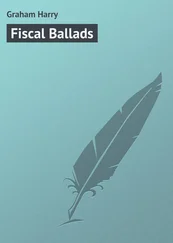Harry Graham - The Mother of Parliaments
Здесь есть возможность читать онлайн «Harry Graham - The Mother of Parliaments» — ознакомительный отрывок электронной книги совершенно бесплатно, а после прочтения отрывка купить полную версию. В некоторых случаях можно слушать аудио, скачать через торрент в формате fb2 и присутствует краткое содержание. Жанр: foreign_prose, на английском языке. Описание произведения, (предисловие) а так же отзывы посетителей доступны на портале библиотеки ЛибКат.
- Название:The Mother of Parliaments
- Автор:
- Жанр:
- Год:неизвестен
- ISBN:нет данных
- Рейтинг книги:5 / 5. Голосов: 1
-
Избранное:Добавить в избранное
- Отзывы:
-
Ваша оценка:
- 100
- 1
- 2
- 3
- 4
- 5
The Mother of Parliaments: краткое содержание, описание и аннотация
Предлагаем к чтению аннотацию, описание, краткое содержание или предисловие (зависит от того, что написал сам автор книги «The Mother of Parliaments»). Если вы не нашли необходимую информацию о книге — напишите в комментариях, мы постараемся отыскать её.
The Mother of Parliaments — читать онлайн ознакомительный отрывок
Ниже представлен текст книги, разбитый по страницам. Система сохранения места последней прочитанной страницы, позволяет с удобством читать онлайн бесплатно книгу «The Mother of Parliaments», без необходимости каждый раз заново искать на чём Вы остановились. Поставьте закладку, и сможете в любой момент перейти на страницу, на которой закончили чтение.
Интервал:
Закладка:
Infants and minors may not be elected to the House of Commons. But though they have always been excluded by custom or statute, their presence was winked at until the end of the eighteenth century. The members of those bygone times seem generally to have been more youthful than the members of to-day. Even the Chair was occupied by men comparatively young, Seymour, Harley, and Sir Thomas More each being elected Speaker before he had reached the age of forty. The last-named speaks of himself as a "beardless boy resisting greybeards and Kings themselves," referring no doubt to the time when Cardinal Wolsey came to the House of Commons in 1523, to ask for money for his royal master, and he actively opposed the grant.
In Queen Elizabeth's time the Lower Chamber was not weakened by the admission of too many infants; but during the reign of James I. the ancient custom for old men to make laws for young ones seems to have been inverted, there being as many as forty members of Parliament who were minors, and several who were not more than sixteen years old. 81 81 Naunton's "Fragmenta Regalia," p. 21.
The poet Waller sat in the Commons before he was seventeen, while Lord Torrington (afterwards Duke of Albemarle) took part in debate when he was only fourteen, and at that age addressed the House in 1667, on the subject of Clarendon's impeachment. 82 82 Shaftesbury's "Life," vol. i. p. 30 n.
The infant members of that day were singularly precocious and well able to look after themselves. When, for instance, some one urged that Lord Falkland was too young to sit in Parliament, as he had not yet sown his wild oats, that young nobleman rudely replied that he could imagine no more suitable place for sowing them than the House of Commons, where there were so many geese to pick them up. 83 83 Townsend's "History," vol. ii. p. 400.
The Crown saw no disadvantage in having youthful legislators, who could all the more easily be influenced. When Parliament assembled in 1661 and the tender age of many of the members was pointed out to King Charles, he answered that he found no great fault in that, "for he could keep them till they got beards." 84 84 Reresby's "Memoirs," p. 51.
By the Act of 1695, however, infants were formally excluded from Parliament, but for a long time they continued to sit in the House, though they most probably abstained from voting.
Extreme youth was not considered a bar to parliamentary success in days when it was possible for a politician to become Prime Minister, as Pitt did, at the age of twenty-five, though that statesman's father found it necessary on one occasion to defend himself against the charge of immaturity. 85 85 "Sir," he said in debate, "the atrocious crime of being a young man, which the hon. gentleman (Horace Walpole) has with such decency and spirit charged against me, I shall neither attempt to palliate or deny; but content myself with wishing that I may be one of those whose follies may cease with their youth, and not of that number who are ignorant in spite of experience."
Both Fox and Philip Stanhope (afterwards Lord Chesterfield) delivered their maiden speeches a month or so before they came of age, 86 86 Chesterfield's "Letters," vol. ii. p. 339. In order to escape the fine of £50 °Chesterfield retired from political life for a short time.
and Lord John Russell was returned to Parliament when he was still a minor.
As the years advanced the House of Commons became more and more particular in this respect, and at the beginning of the nineteenth century an eye-witness was struck by the large proportion of bald-headed men – nearly a third of the whole number – in the Lower Chamber. 87 87 Grant's "Recollections," p. 62.
To-day no one who has not reached the mature age of twenty-one can stand for Parliament, much less sit upon the sacred green benches.
Lunatics and idiots are also disentitled to parliamentary election. A member who goes mad after having taken his seat can only be removed, however, if his case is proved to be a hopeless one, the House being then petitioned to declare the seat vacant, and the Speaker issuing a new writ. In one well-known instance a committee of the House found that a member's lunacy was not so incurable as to justify his removal, and he retained his seat. In 1881 the case of a lunatic recording his vote in a division was the occasion of a painful and futile debate. The member in question suffered from periodical bouts of insanity, and had recently been certified "dangerous" at his own request, in order that he might retire temporarily to an asylum. It was therefore obviously improper for him to vote. The House, however, declined to take any serious notice of the incident, the motion for an inquiry by a Select Committee into the circumstances of the case being negatived, and the matter tactfully allowed to drop. 88 88 See Hansard, vol. clxii. p. 1941.
Aliens cannot sit in Parliament until they have taken the precaution of becoming naturalised British subjects. In William III.'s time all persons born outside the dominions were disqualified, and when the Test and Corporation Acts were repealed in George IV.'s reign, an amendment was inserted by the Bishop of Llandaff in the House of Lords by which Jews were excluded from Parliament. They were finally admitted to the House of Commons in 1858, and during the reign of Queen Victoria naturalisation was held to carry with it full political rights.
English and Scottish peers are incapacitated from serving in the Commons. Irish peers, however, may do so, provided that they are not already sitting as representative peers in the House of Lords. 89 89 When the Lords were temporarily abolished in 1648, peers were elected to the Commons, but only a few seem to have availed themselves of this privilege. Porritt's "Unreformed House of Commons," vol. i. p. 123.
The eldest sons of peers were excluded from the Lower House down to the middle of the sixteenth century, when they were gratefully admitted and given seats of honour on the front bench with the Privy Councillors.
Irishmen enjoy parliamentary privileges not only as peers but also as bankrupts. The occasional combination of the two therefore carries with it some slight compensation. A bankrupt Englishman or Scotsman is disabled from even standing as a candidate for Parliament, whereas his more fortunate Irish brother may be elected. Members of Parliament who become bankrupt after election may continue to sit and vote in the Commons until the Speaker has received official notification of their bankruptcy, or the House has ordered their withdrawal.
The election of clergymen and other ministers was prohibited by an Act of 1801, passed in order to deal with the case of the Rev. J. Horne Tooke, the "Father of Radicalism," who had been elected for Old Sarum. It did not succeed in its object, however, for he continued to sit for the remainder of the Parliament. 90 90 Horne Tooke was a man of strength and determination. Upon all great public questions, as he once declared, "neither friends nor foes, nor life nor death, nor thunder nor lightning, would ever make him give way the breadth of one hair." When Lord Temple claimed a superior right to sit in Parliament because he had "a stake in the country," "So have I," said Tooke, "but it was not stolen from a public hedge!"
And by another Act, passed about 1870, any one who has relinquished the office of priest or deacon is eligible for election. Otherwise no minister of the Established Church may sit in Parliament.
Many other persons are similarly debarred, among whom may be mentioned the holders of offices under the Crown created since 1705, Crown pensioners (exclusive of civil servants and diplomats), and Government contractors. Persons guilty of treason or felony (who have neither served their sentence nor been pardoned), or of corrupt practices at elections are likewise disqualified, 91 91 In 1558 it was voted by a small majority that one outlawed or guilty of various frauds might sit in the House if duly elected, his crimes being apparently purged by virtue of his election. See Raikes's "English Constitution," vol. i. p. 323.
as are also those who are unable to take the Oath of Allegiance or to affirm. There are, besides, a number of officials connected with the administration of justice, or concerned with the collection of the Revenue, or representatives of the Crown – judges, colonial governors, etc. – who are incapacitated by their positions from sitting in the House of Commons.
Интервал:
Закладка:
Похожие книги на «The Mother of Parliaments»
Представляем Вашему вниманию похожие книги на «The Mother of Parliaments» списком для выбора. Мы отобрали схожую по названию и смыслу литературу в надежде предоставить читателям больше вариантов отыскать новые, интересные, ещё непрочитанные произведения.
Обсуждение, отзывы о книге «The Mother of Parliaments» и просто собственные мнения читателей. Оставьте ваши комментарии, напишите, что Вы думаете о произведении, его смысле или главных героях. Укажите что конкретно понравилось, а что нет, и почему Вы так считаете.
